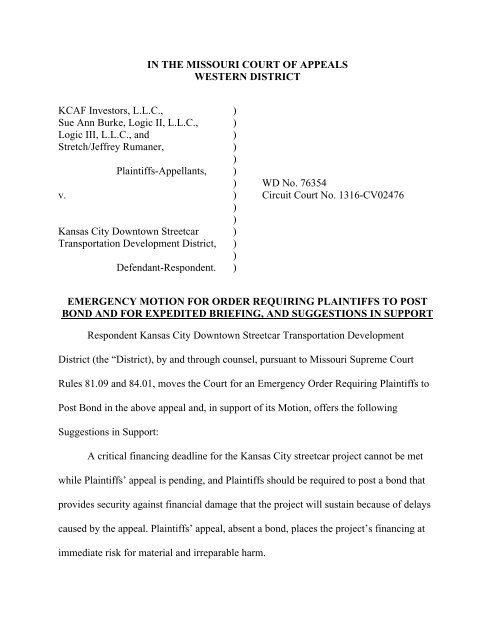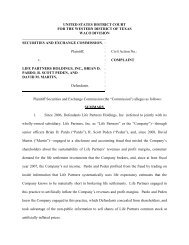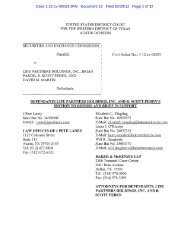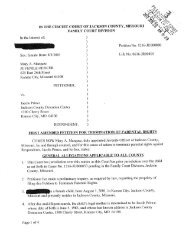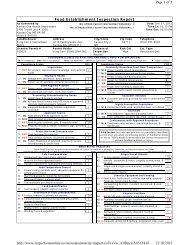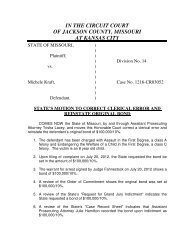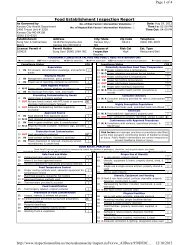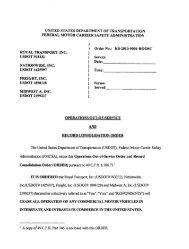emergency motion - The Pitch
emergency motion - The Pitch
emergency motion - The Pitch
Create successful ePaper yourself
Turn your PDF publications into a flip-book with our unique Google optimized e-Paper software.
IN THE MISSOURI COURT OF APPEALSWESTERN DISTRICTKCAF Investors, L.L.C., )Sue Ann Burke, Logic II, L.L.C., )Logic III, L.L.C., and )Stretch/Jeffrey Rumaner, ))Plaintiffs-Appellants, )) WD No. 76354v. ) Circuit Court No. 1316-CV02476))Kansas City Downtown Streetcar )Transportation Development District, ))Defendant-Respondent. )EMERGENCY MOTION FOR ORDER REQUIRING PLAINTIFFS TO POSTBOND AND FOR EXPEDITED BRIEFING, AND SUGGESTIONS IN SUPPORTRespondent Kansas City Downtown Streetcar Transportation DevelopmentDistrict (the “District), by and through counsel, pursuant to Missouri Supreme CourtRules 81.09 and 84.01, moves the Court for an Emergency Order Requiring Plaintiffs toPost Bond in the above appeal and, in support of its Motion, offers the followingSuggestions in Support:A critical financing deadline for the Kansas City streetcar project cannot be metwhile Plaintiffs’ appeal is pending, and Plaintiffs should be required to post a bond thatprovides security against financial damage that the project will sustain because of delayscaused by the appeal. Plaintiffs’ appeal, absent a bond, places the project’s financing atimmediate risk for material and irreparable harm.
Plaintiffs are two disgruntled taxpayers (and their companies) who oppose theone-percent retail sales tax and certain real property special assessments that wereapproved for the development of the District’s streetcar project (the “Project”) by anelection of qualified voters, as certified on December 12, 2012. On January 31, 2013,Plaintiffs filed a four-count declaratory judgment and injunctive relief petition, seeking tohave the sales tax and special assessments declared illegal and/or unconstitutional andenjoined, based on Plaintiffs’ view that (1) the election approving the District fundingmechanisms violated their equal protection and due process rights under the MissouriConstitution (Counts II through IV) and (2) the one-percent retail sales tax in the portionof the District that overlaps the boundary of another unrelated TransportationDevelopment District violates a one-percent sales tax rate limitation for individualTransportation Development Districts set by R.S. Mo. section 238.235.1(7) (Count I). Seegenerally Landes Affidavit, attached hereto as Exhibit A, at 15.But Plaintiffs’ challenges have all been waived. <strong>The</strong> Missouri ComprehensiveElection Act of 1977 (the “Act”) requires that any challenge to an election contest befiled “[n]ot later than thirty days after the official announcement of the election result”(R.S. Mo. § 115.577), in keeping with the Act’s policy “to require the prompt resolutionof questions relating to elections.” Based on the Act’s thirty-day limit, and the fact thatPlaintiffs’ petition was filed fifty days after the election results were certified, the circuitcourt dismissed Counts II through IV of Plaintiffs’ petition with prejudice as time-barredelection contests. See id. <strong>The</strong> circuit court also held that Plaintiffs were equitablyestopped from belatedly asserting Count I, challenging the legality of the sales tax2
funding mechanism, because Plaintiffs were provided with notice and opportunity to beheard concerning the legality of the sales tax funding mechanisms during April 2012 preelectioncircuit court proceedings and, although Plaintiff Sue Burke testified in a publichearing to oppose the funding mechanisms, Plaintiffs filed no opposition pleading in thatproceeding. See id.As the circuit court held in dismissing Plaintiffs’ petition, “the purpose of lastApril’s proceedings was to determine the legality and constitutionality of the District andits Funding ‘before any public dollars are spent,’” and “[t]hat purpose would beeviscerated if Plaintiffs were allowed to proceed on their Petition at this late date.” Id.Plaintiffs’ attempted appeal to this Court continues to eviscerate that purpose. Inreliance on the December 12, 2012 election results, which were not timely challenged,the City of Kansas City, Missouri appropriated certain funds and, to date, hasencumbered approximately $3,600,000.00 of those funds to develop the Project throughapplication of District revenue. Id. at 17(e). A critical funding application deadlinelooms on June 3, 2013, and the District and City cannot meet that application deadline(which requires a showing of (1) project preparedness, (2) lack of delay risk, and (3) aviable financing package) while this appeal is pending. Id. at 17(a). Meanwhile, theCity’s financial condition (on which the Project’s financing options rely) is held hostageby the City’s need to cover its encumbered (but as-yet-unreceived) Project funds withcash from other unrelated City funds. Id. at 17(e), 17(f). Additionally, each passingday leaves the District’s Project financing susceptible to escalating bond rates andconstruction costs. See id. at 17(d), 17(g).3
Plaintiffs had opportunity to challenge the legality of the District’s fundingmechanisms in April 2012, and chose not to do so. Nevertheless, deciding many of thesame constitutional and legal issues that Plaintiffs’ petition raises, the circuit court ruledin April 2012 that the District’s funding mechanisms (and the election methods toapprove them) were neither unconstitutional nor illegal. See id. at 10.It cannot be the law in Missouri that one or two unhappy taxpayers, whose legalclaims were previously rejected by the circuit court on both substantive and proceduralgrounds, can threaten the viability of a voter-approved $100 million-plus project bysimply continuing to press what are by now surely frivolous claims through the courtswithout at a minimum posting a bond to satisfy the damages their (likely unsuccessful)appeal will cause. <strong>The</strong> District respectfully urges the Court that in this uniquecircumstance, as set forth more fully below, Plaintiffs should be required to post a bondin an amount sufficient to cover any Project financing losses (including lost financingopportunities) that occur as the result of Plaintiffs’ pending appeal, on penalty ofdismissal. <strong>The</strong> District submits that an appropriate bond amount is $20 million. Seegenerally id. at 17(a)-17(h), 18. And because of the tremendous time and financialpressures to which the District, the City, and the Project are now subjected, the Districtrespectfully requests that the Court consider its <strong>motion</strong>, and order any responsivebriefing, on an <strong>emergency</strong> and expedited basis.Background<strong>The</strong> District was formed by the approval of qualified voters in a public election“for the purpose of developing” the Project, including “the design, construction,4
ownership and/or operation of a downtown fixed rail streetcar line, and all elementsthereof, including without limitation a maintenance facility, operating within theboundaries of, or serving and benefiting, the proposed District.” Id. at 3. But before anelection on the District’s formation could even be held, a formation petition had to befiled and subjected to a statutory public notice, hearing, and judicial approval process.See generally id. at 2-13.Notice was therefore ordered by the circuit court and published in the Kansas CityStar once a week for four consecutive weeks from February 11, 2012 to March 3, 2012.Id. at 6. <strong>The</strong> notice described the petition’s filing, advised the public of dates for publicand judicial hearings, and advised the public that pleadings in support of or opposition tothe petition were to be filed with the circuit court no later than April 2, 2012. Id.Timely responsive pleadings were filed in support of and opposition to thePetition, but no Plaintiff in the instant case filed a responsive pleading. Id. at 7, 9. Atthe April 17, 2012 public hearing, three persons testified in opposition to the petition,including Sue Burke, who is a Plaintiff in the instant case. Id. at 8. Ms. Burke testifiedto her view that the funding mechanisms proposed by the City Council and PortAuthority were illegal “taxation without representation” and that it was improper that she,a Kansas City resident and District landowner, would not be allowed to vote on theDistrict and its funding mechanisms. Id.After a judicial hearing, the circuit court entered a Judgment on April 27, 2012,approving the formation petition. Id. at 10. <strong>The</strong> Judgment expressly analyzed the“qualified voter” question raised by certain persons who opposed the petition (including5
Ms. Burke), and held that, under Mo. Const., art. VIII, § 2, neither the proposed Districtnor its proposed funding mechanisms were illegal or unconstitutional, and that petitionopponents had been “duly served with process.” See generally id. (citing and attachingApril 27, 2012 Judgment).No person or entity appealed the circuit court’s Judgment.Qualified voters thereafter approved both the formation of the District and theDistrict’s proposed funding mechanisms in two separate elections. See id. at 11-13.Results of the second election, approving a one-percent retail sales tax and certain realproperty special assessments, were certified on December 12, 2012. Id. at 13.But on January 31, 2013, a full 50 days after the funding mechanism electionresults were certified and 282 days after the circuit court entered its Judgment finding theDistrict and its financing mechanisms to be legal, Plaintiffs filed a Petition forDeclaratory Judgment and Injunctive Relief against the District. Id. at 15. On February8, 2013, the District filed a Motion to Dismiss, Motion for Expedited Proceedings, andSuggestions in Support. See generally id. (citing Dismissal as attached to Plaintiffs’Notice of Appeal). <strong>The</strong> District argued that Plaintiffs’ Counts I through IV were simplydisguised “election contests” that were time-barred under the Missouri ComprehensiveElection Act of 1977. See id. <strong>The</strong> District also argued that, even if Counts I through IVwere not time-barred, they would be subject to dismissal by estoppel in that Plaintiffs hadnotice of and opportunity to object to each aspect of the 2012 litigation (and that Ms.Burke had even personally appeared to testify in opposition to the Amended Petition at6
the public hearing), yet chose to file nothing and not to appeal the circuit court’sJudgment. See id.On March 15, 2013, after expedited briefing and the submission of proposedorders, the circuit court adopted the District’s proposed order and judgment, dismissingPlaintiffs’ case with prejudice. Id. No post-trial <strong>motion</strong>s were filed.In the interim, in reliance on the certified election results, the Kansas City,Missouri City Council passed an ordinance to estimate bond proceeds concerning bondsthe City intended to issue to further the District’s purpose, i.e., Project development. Id.at 17(3). <strong>The</strong> ordinance estimated and concurrently appropriated $30 million in revenuebond proceeds to be used by the Director of Public Works for Project development. Id.To date, approximately $3,600,000.00 of the appropriated funds have beenencumbered in Project development contracts. Id. at 17(e). Due to the continuingpendency of Plaintiffs’ litigation, however, the City has not yet been able to issue bonds.Id. at 17(b), 17(f). No bond proceeds have therefore been received to cover theappropriated and encumbered funds, and other City funds within the City’s fundaccountingsystem will have to be applied to cover Project encumbrances, negativelyimpacting the City’s financial position (on which the District’s Project-developmentfinancing options rely). See id. at 17(e), 17(f).Further, the Project’s financing plan has, from its inception, included acommitment to District property owners that opportunities for federal governmentparticipation would be maximized. Id. at 17(a). This commitment includes applicationfor U.S. Department of Transportation “Transportation Investment Generating Economic7
Recovery” (“TIGER”) grant funds. Id. <strong>The</strong> Project’s complete application for the TIGERgrant, showing (1) project readiness, (2) low risk of delay, and (3) a viable financingpackage, is due June 3, 2013. Id.Unless Plaintiffs’ litigation is resolved before June 3, 2013, the District and Citycannot demonstrate to the federal Department of Transportation that the Project meetsTIGER grant primary selection criteria, and the Project’s financial viability will bematerially adversely affected. See id. Plaintiffs therefore should not be permitted toproceed with their appeal unless they post a bond that constitutes adequate security fordelay damages, including but not limited to lost financing opportunities and escalatingbond and construction costs, caused by the appeal.Argument<strong>The</strong> “democratic freedom to challenge the government can lead to anarchy, as itcan tie up numerous government actions in the courts needlessly, allowing one or a fewdisgruntled taxpayers to stop multimillion-dollar projects in their tracks for no apparentor worthwhile reason.” 41 A.L.R. 5th 47 (1996). On these very grounds, courtsfrequently—whether relying on statute or equitable considerations—require taxpayerswho file challenges to government actions to post an appropriate bond. See id. (citingcases).While Missouri may have no statute that would require Plaintiffs to post a bond tocontinue their appeal under the precise circumstances set forth above, the legislature hasacknowledged the havoc dissatisfied individuals may visit on final election results bydecreeing that where an election contest is filed, “the court or legislative body may8
equire the contestant to post bond for the costs and expenses of the election contest.”R.S. Mo. § 115.591. This rule, which discourages frivolous election contests, goes handin-handwith the Election Act’s thirty-day limit in which to file an election contest (seeR.S. Mo. § 115.577); that is, both sections further the Election Act’s policy “to requirethe prompt resolution of questions relating to elections.” Beatty v. Metropolitan St. LouisSewer Dist., 700 S.W.2d 831, 838 (Mo. 1985). Here, of course, although Plaintiffs areeffectively challenging an election result, they have met neither the 30-day deadline norany bonding requirement.Missouri’s policy of encouraging the prompt resolution of cases is not limited toelection cases. Indeed, Missouri Rule of Civil Procedure 81.09, which governs theposting of supersedeas bonds to stay judgment executions pending appeal, expresslyprovides for security against, inter alia, “damages for delay” caused by an appeal.“Damages for delay” include all “damages arising from the delay occasioned by theappeal as may properly constitute legal damage to the party delayed.” Green v. Perr, 238S.W.2d 922, 924 (Mo. App. 1951). And beyond Rule 81.09, Missouri courts have“inherent power to preserve the status quo.” State ex inf. Attorney Gen. v. Shull, 887S.W.2d 397, 402 (Mo. banc 1994).Given the unique circumstances of this case, the Court should exercise its inherentpower to provide the District relief and security from “damages for delay” and, in fact,irreparable harm that will befall it, the City, the Project, and District beneficiaries ifPlaintiffs’ appeal is permitted to proceed, absent a bond. Plaintiffs’ appeal is exceedinglyunlikely to succeed (in fact, given Plaintiffs’ missed deadlines and the earlier final9
adjudication of all challenges, it may well constitute an abuse of process), yet its merependency—absent a bond that provides the District adequate security for delaydamages—threatens to prevent the District’s voter- and court-approved Project frombeing realized.Plaintiffs’ appeal in fact has the same practical effect on the District’s Project as ifPlaintiffs’ underlying claim for injunctive relief had been granted. But an order forinjunctive relief only issues where a plaintiff has executed a sufficient bond to “pay allsums of money, damages and costs” incurred if the injunction is dissolved. Mo. R. Civ. P.92.02(d); see also Mo. R. Civ. P. 92.03 (providing for bond pending appeal of injunctionruling). Plaintiffs should not be permitted to reap the benefits of a de facto injunctionwithout having to comply with an injunction bond condition simply by appealing theJudgment that denied their claim for an actual injunction.If Plaintiffs are permitted to pursue their appeal without posting security, andthereby ultimately block the Project from proceeding (despite later losing on appeal),what is to stop future opponents of voter-approved projects from filing cases assertinglegal theories that have already been procedurally and substantively rejected by thecourts, so that the cases’ mere pendency can prevent government projects from movingforward? A bond sufficient to secure and repay all out-of-pocket losses that the Districtincurs as the result of Plaintiffs’ appeal will prevent this result.<strong>The</strong> District therefore moves the Court to order expedited briefing on and<strong>emergency</strong> consideration of this <strong>motion</strong>, and to require Plaintiffs to post a bond in theamount of $20 million, on penalty of dismissal, within seven days of the Court ordering10
Plaintiffs to post a bond. And should the Court determine that the interests of promptfinality are uniquely implicated in these circumstances (particularly given the loomingTIGER grant application deadline), the District respectfully suggests that the Courtconsider (on its own <strong>motion</strong>) immediate transfer of this appeal to the Missouri SupremeCourt under Rule 83.01 for expedited hearing of the bond issue and, if necessary,disposition of the entire appeal.Respectfully submitted,POLSINELLI, PC/s/ Robert A. HendersonRobert A. Henderson (Mo. 28566)Miriam E. C. Bailey (Mo. 60366)Douglas S. Stone (Mo. 45320)Twelve Wyandotte Plaza120 W. 12 th StreetKansas City, Missouri 64105816-421-3355Fax 816-374-0509Attorneys for Respondent11
CERTIFICATE OF SERVICE<strong>The</strong> undersigned hereby certifies that on this 29th day of April, 2013, theforegoing was filed electronically with the Missouri Court of Appeals, Western Districtand served via U.S. Mail, postage prepaid, and electronic mail to:Mark J. Bredemeier305 SE Alexandria DriveLee’s Summit, MO 64063Attorneys for Plaintiffs KCAF Investors,LLC, et al./s/ Robert A. HendersonAttorneys for Respondent12


